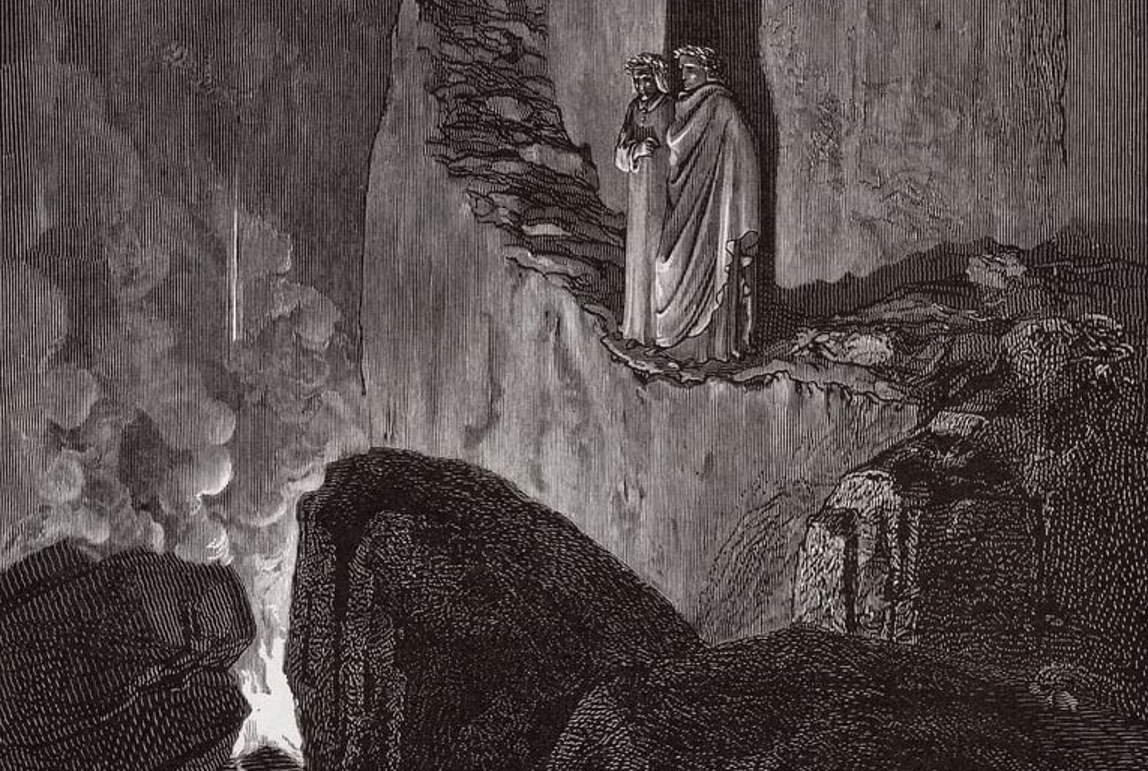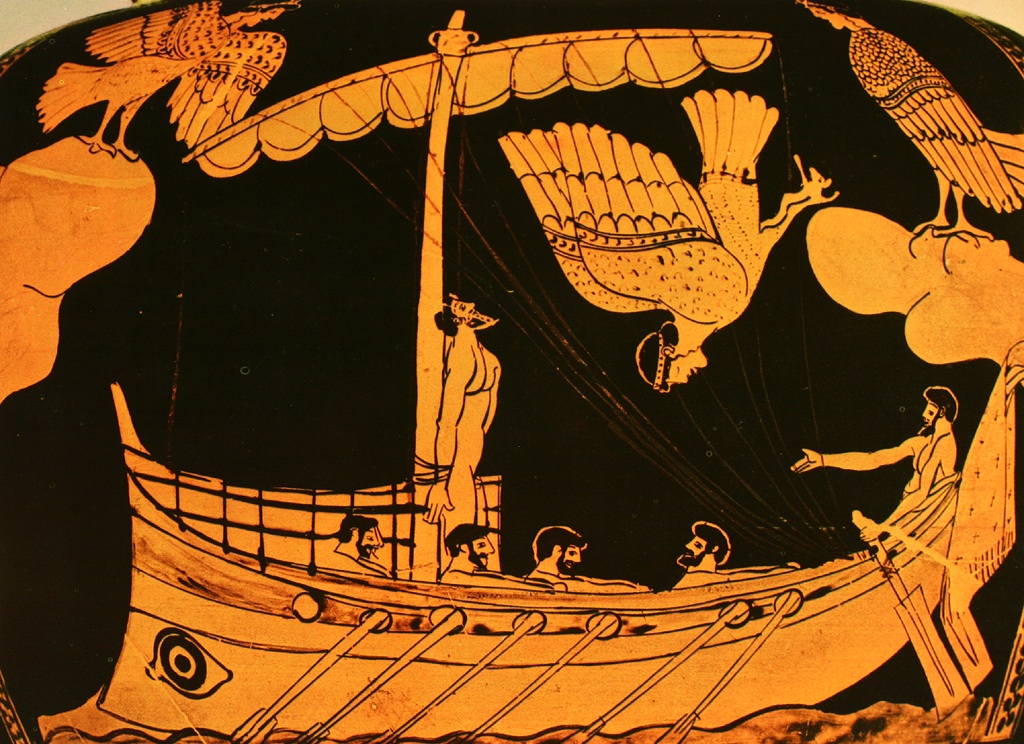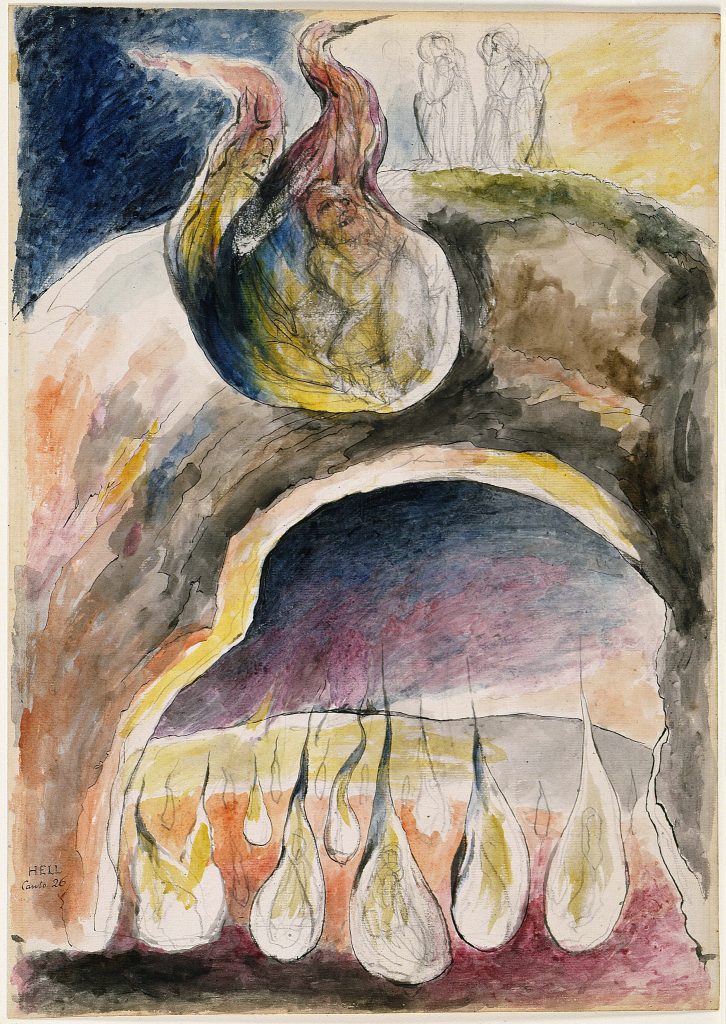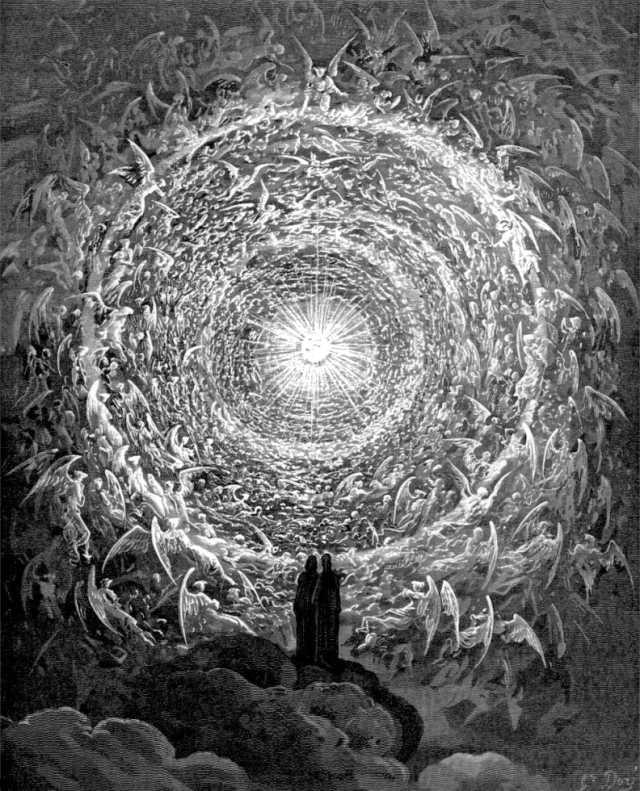by Justin D. Lyons, Contributing Writer, Classical Wisdom
Dante’s epic poem, The Divine Comedy (completed in 1320) is full of allusions. As readers travel the road through Hell, Purgatory, and Paradise, they are everywhere confronted with names and stories stretching back to classical mythology. The classicist will find a great many familiar characters. But one of these, Ulysses (also known by his Greek name, Odysseus), is central to Dante’s journey through the afterlife.
Dante’s presentation of Ulysses was not drawn directly from Homer, but from Virgil, Statius, Ovid, and especially Cicero. Cicero linked Ulysses for a drive for knowledge and wisdom. In De Finibus (V.18), Cicero described Homer’s account of the call of the Sirens, which exerted a powerful draw on Ulysses, as an offer of knowledge. Thus, Ulysses becomes an archetype for all who possess a passionate love of learning, disdaining hardship in pursuit of knowledge.
Dante incorporates the classical tradition into his Ulysses, adopting the Roman view of the man as a treacherous schemer, placing him among the false counselors in the eighth circle of Hell for his deceptions and tricks. (Inferno XXVI. 58-63). But these offenses are not the emphasis of the Canto. The highlight is Dante’s presentation of the story of the last journey of Ulysses, which seems to be the poet’s own invention.
Dante makes the search for knowledge the impetus for Ulysses’ fateful journey. It is his “burning wish/ to know the world and have experience/ of all men’s vices, of all human worth” (Inferno XXVI. 97-98) that drives him to take to the open sea and sail into the unknown. Ulysses’ rhetorical skill is present in the story as he convinces his crew to undertake the journey. When they have reached the Pillars of Hercules, beyond which men are not permitted to go, Ulysses exhorts them in terms of love of knowledge:
…do not deny
yourself experience of what there is beyond,
behind the sun, in the world they call unpeopled.
Consider where you came from: you are Greeks!
You were not born to live like mindless brutes
But to follow paths of excellence and knowledge. (Inferno XXVI. 118-120)
Ulysses’ appeal makes them eager to pass the boundary, an act which is clearly illicit. The end of that “mad flight” (Inferno XXVI .125) is that, after Ulysses has a faint glimpse of that which was never meant to be seen by living man, he and his crew are struck down by the will of God (Inferno XXVI. 127-142).
By incorporating Ulysses into the Commedia, Dante has brought him into a Christian framework. By placing him in Inferno, Dante passes a moral judgment. Dante is writing for a Christian audience with a developed concept, not only of vice, but of sin: offense against the laws of God. In this light, the moral violations of Ulysses are important for understanding his role in the poem. First, the main point of the Canto is that Ulysses crossed the boundaries set for man by the divine order. Doing so was a sin, for which he was destroyed. The sinful nature of the act becomes fully clear in Paradiso, when Adam describes the first human sin:
Know now, my son, the tasting of the tree
Was not in itself the cause of such a long exile,
but only the transgression of God’s bounds. (Paradiso XXVI. 115-117)
All human sin shares the character of this first parent; all sin involves violating boundaries for thought or action set by God. That Ulysses passed those boundaries with deliberateness only adds to the fault. He presumed to go by his own power where God had ordained that no man may go.
Second, Ulysses used his natural gift of eloquence to persuade others to illicit action: he is a false counselor. He persuades his crew to overstep the limits set for man and defy the divine order. They are punished for their presumption with a watery death. But does not a greater burden of guilt lie on Ulysses, who persuaded them to sin? Dante must have in mind the words of Christ (Matthew 18:6):
If anyone causes one of these little ones—those who believe in me—to stumble, it would be better for them to have a large millstone hung around their neck and to be drowned in the depths of the sea.
There are important parallels between the journey of Ulysses and that of Dante the pilgrim (Dante within the poem). The pilgrim gains the knowledge Ulysses sought, seeing clearly what Ulysses only glimpsed before he was destroyed. In fact, the Commedia seeks to describe the whole divine ordering of the universe. The question arises: is Dante not also guilty of presumption, of sailing seas never intended for man?
There are a great many allusions to Ulysses throughout the Commedia, employing the imagery of water, boats, and unknown seas. Many of these reminders implicitly compare the pilgrim’s success to Ulysses’ failure. As he leaves Inferno, Dante reminds us that he is able to go on, having passes through regions no one else has navigated:
For better waters, now, the little bark
of my poetic powers hoists its sails,
and leaves behind that cruelest of the seas (Purgatorio I.1-3)
When Dante reaches the edge of purgatory, the reader is given a pointed reminder that the pilgrim is the only living man to set foot here:
At last we touched upon the lonely shore
that never yet has seen its waters sailed
by one who then returned to tell the tale. (Purgatorio I. 130-132)
When he reaches paradise, Dante looks down from the spheres. Now far above earth he can trace with his eye the insignificant route Ulysses managed to sail in his presumption:
I saw beyond Cadiz to the mad route
Ulysses took, and nearly to the shore
Europa left as a sweet godly burden. (Paradiso XXVII. 82-84)
The point of Dante’s references to Ulysses is not merely that the pilgrim succeeded where Ulysses failed. The pilgrim has managed to make his journey for a reason: he has received divine sanction and guidance. That Dante the pilgrim is on a divinely-ordained journey is made abundantly clear in the poem. The forces of heaven move with personal intent toward Dante, initiating his journey for the sake of his soul.
These lines alone are sufficient to clear the pilgrim of the charge of presumption. He does not go trusting in his own ability or in violation of divine authority. The contrast with Ulysses is pointed.
The pilgrim also displays a great deal of humility when he learns of the journey he is to take, recognizing that he cannot claim equality with those who, while still living have previously been admitted to the regions beyond mortal habitation:
But why am I to go? Who allows me to?
I am not Aeneas, I am not Paul,
neither I nor any man would think me worthy. (Inferno II. 31-33)
Dante’s humility is, of course, in dramatic contrast with the self-assertiveness of Ulysses as he appears in the tradition and in the Commedia. It is true that throughout the poem the pilgrim exhibits a thirst to know at least as great as that which characterized Ulysses, but he is often afraid to ask his questions out of fear of violating some law of propriety. Moreover, his divinely-appointed guides do not discourage his questioning, legitimating his desire for knowledge. Dante the pilgrim, then, is intentionally contrasted with Ulysses and is innocent of presumption in both thought and deed.
Dante, the poet, however, might be another matter. Dante wrote that he was neither Aeneas nor Paul. Yet his poetry does what Aeneas did in going to the infernal regions and does what Paul did in seeing heaven itself (2 Corinthians 12:2). He has presented an image of the whole divine order without any sanction other than his own imagination. The pilgrim is the literary figure for Dante himself, who has created the conditions of the poem which clear the pilgrim of presumption. By doing so is the poet trying to clear himself, outside the poem, of the same charge?













No comments yet. You should be kind and add one!
Our apologies, you must be logged in to post a comment.